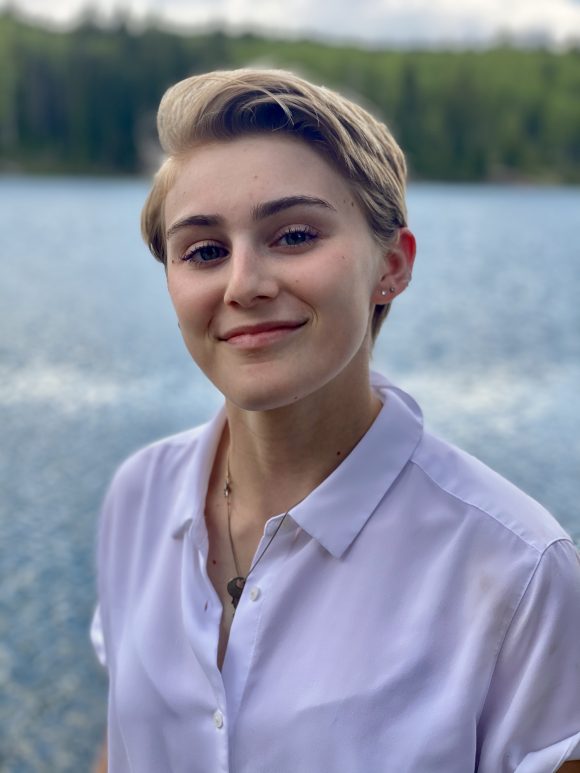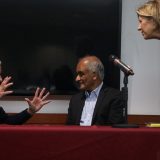Alum Taylor Hein: Disability Rights Change-maker
November 11, 2021
Taylor Hein (‘21, English B.A.; Disability Studies and Holocaust History minor ‘21) recently received a law fellowship with The Coelho Center for Disability Law, Policy & Innovation at Loyola University The center strives to “strengthen the pathway into law school for students with disabilities” so that representation of the disability community is felt at every level of the legal system. The Coelho Center is headed by Wilkinson alum Katherine Perez (‘06, Spanish and Psychology double-major) who received Wilkinson College’s 2020 Distinguished Alumni Award.
The Voice of Wilkinson had the chance to speak to Taylor about her experiences in Wilkinson and recent achievements.
Voice of Wilkinson: Why did you choose to major in English? And minor in Disability Studies and Holocaust History?
Taylor Hein: I had wanted to be a writer since I was a little kid and enjoyed studying English throughout high school, so I decided to major in English at Chapman. As I began taking courses on literary theory and rhetoric, I found a new passion that made me excited every day to go to class. I added a Holocaust History minor because I have always been interested in World War II history. I added a Disability Studies minor late in my junior year after founding the Chapman Spoonies a year prior, a club to support students with chronic illnesses. I wanted to study the socio-cultural, political, and legal forces at work in disabled people’s lives in order to become a more educated and effective leader. I integrated my activism with scholarship, writing at the intersection of rhetoric, history, disability studies and the law. With an interdisciplinary curriculum for my majors and minors and the support of incredible faculty, I found the niche that prompted me to apply to law school.
VoW: What was your most significant hardship in your journey to obtaining your degree?
TH: The most significant hardship I faced in my journey to obtaining my degree were my chronic illnesses, both socially and physically. When I was first diagnosed, I felt isolated because I didn’t know anyone else at Chapman with a chronic illness or other disability. As I found my community in creating The Spoonies, I faced health challenges working 20-30 hours a week and going to school full-time. It was difficult to take care of myself and make time for rest when I had so many projects I was passionate about. I fight my illnesses everyday to accomplish what I need to get done. Although I don’t always win the daily battles, the support of my community and faculty, as well as the intellectual engagement of my courses during my undergraduate career were what helped me obtain my degree.
VoW: What is the Coelho Center in your own words?
TH: The Coelho Center is enriching and empowering. The work that the center is doing to build a pipeline for students with disabilities to attend law school and be successful is not being done anywhere else. I am proud to be a part of a cohort of fellows with a range of disabilities and diverse backgrounds. We each bring something unique and compelling to the table. I have learned so much from my peers and have deepened my understanding of what it means to be disabled socially, culturally, and politically. The Coehlo Center has brought together impassioned, intelligent future leaders of disability law, policy, and activism, and I am honored to be a part of it.
VoW: What does your day-to-day look like at your internship?
TH: For the law fellowship, our cohort underwent a summer intensive disability rights law course and we meet once a month for a discussion/workshop. We are all working on individual projects due next May in which we either write about a disability law and policy issue and/or organize a panel of policy experts to speak on a disability law and policy issue. These projects give us the opportunity to collaborate with both our peers and those in government and non-government entities to work toward solving real problems for our community that we might not otherwise be able to without the resources and support of the Coehlo Center.
VoW: What are your plans for the future?
TH: My plans are to attend law school. I hope to become a public interest lawyer and work with the government, non-profits, and non-governmental organizations to better the lives of people with disabilities. I am particularly interested in disability advocacy law, especially cases pertaining to the Americans with Disabilities Act, and public health law. My goal for the future is to help enact systemic change in our healthcare and legal systems.
VoW: Any advice or words of encouragement you can give to current Wilkinson students?
TH: Have an open mind and embrace opportunities to make your education more interdisciplinary. Take classes you might not otherwise take to expand your knowledge beyond your major/minor requirements. Apply for the fellowships and internships that would enable you to pursue your passions, even if you might think you’re not qualified for them–have confidence in yourself and don’t let the imposter syndrome get to you. Continue to champion the significance of studying the humanities.
Being a part of Wilkinson means that our job as learners is to think critically and bring our skills and abilities to real-word problems and socio-cultural contexts, and fulfilling this responsibility is even more important today. We are social justice activists, we are influencers of culture, we are changemakers, and we are leaders.


